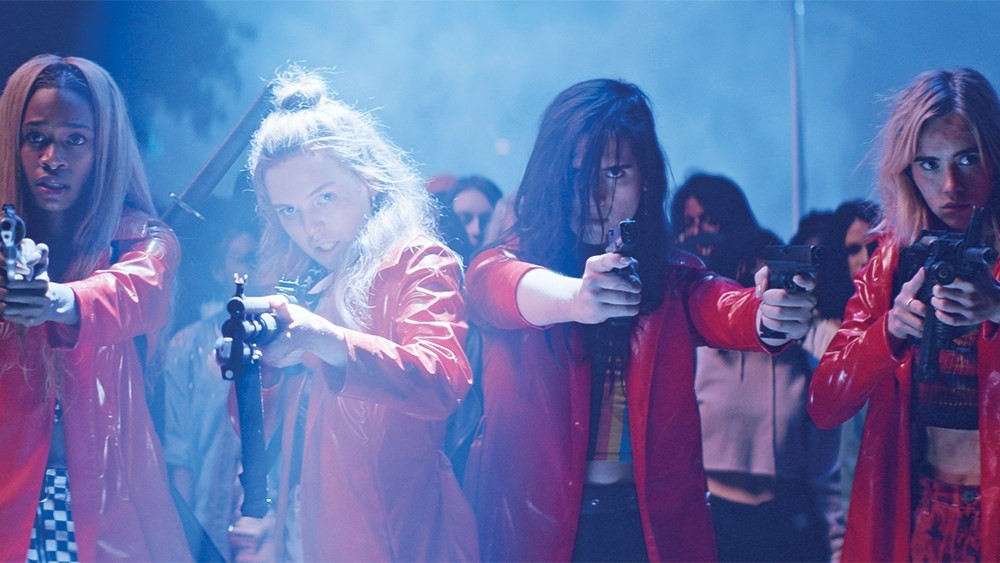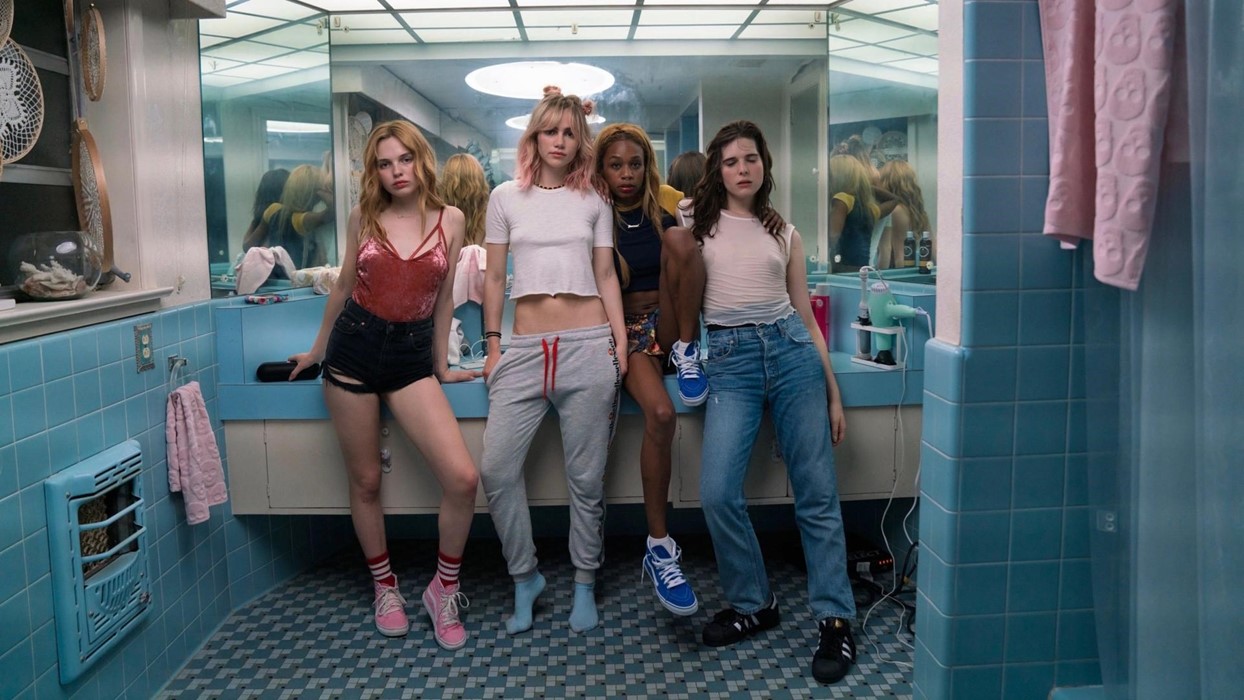As her new film Assassination Nation arrives in UK cinemas, the actress talks to AnOther about the realities of growing up on the internet today
“It’s a comedy, a drama, a teen coming-of-age film wrapped up in a popcorn-crunching blockbuster,” says actress Hari Nef, when asked her how she’d describe her new film, Assassination Nation. A modern-day retelling of the Salem witch trials in the Snapchat age, it’s just that – an irreverent, candy coloured pop-horror which aims to skewer fragile masculinity and misogynistic hysteria with Sahara-dry satire and four matching red plastic macs.
When a mysterious hacker dumps the texts, emails, photos and search histories of more than half an American town’s residents on the internet for all to see, collective panic turns into hivemind rage as the injured parties begin their hunt for a scapegoat. Four high-school friends – Lily (Odessa Young), Bex (Nef), Sarah (Suki Waterhouse) and Em (Abra) – fit the bill perfectly. Their unflinching willingness to call out sexist double standards makes them the perfect target, and a chain of sexts and nude photos between Lily and an older, married man becomes all the evidence the mob needs to exact their revenge for the hack.
The ensuing violence becomes what Nef calls the “personification of alt-right Twitter”, an uncensored look at what it means for women and girls to grow up on the internet today. Even if we don’t have mobs of men scouring the streets looking for women to rape and kill, the violence Lily, Bex, Sarah and Em have to confront will be all too familiar to women used to the grim realities of social media. “What’s not really acknowledged is that, 15-, 16-, 17-year-old girls are kind of living this right now. That’s how it always was for me, and I think that’s how it is for most girls. Even from the time you’re 13, especially when you have the internet, you’re exposed to so much.”

That honesty about what it’s like to curate your life on an internet that can so often be hostile to millennial women is what caught Nef’s attention when she first got hold of the script. Despite being written and directed by a man (Sam Levinson), Nef was struck by the authenticity of the relationships between the four girls and by their willingness to stand by one another through times of crisis. “It was much more vivid than what I was used to experiencing from scripts that represented late-millennial, early gen-Z women; their individual struggles are smoothed over by a collective sense of community and a sense of being a unit in a hostile environment.”
More compelling still was the fact that, despite their being the target of so much hate, the quartet of friends aren’t without their flaws either. “Looking at my character Bex, her transformation over the course of this film is emblematic of the larger message that we’re trying to send – learning how to see past polarised lines of ideology to the people who are like you.” That message of empathy, says Nef, is core to the whole film. “I hope that people don’t think we’re trying to get on any kind of a soap box and preach, I believe above all in the fun of this film. It’s so entertaining because it’s cathartic. We’re not trying to give a lecture about feminism here, we’re trying to reach across the aisle to whatever lies on the other side. We want to tell a story at the heart of which lies a dearth of empathy. We see so much violence and so much chaos which could be avoided just by re-personalising the ideas that are being so viciously opposed by this angry mob,” Nef says. “The girls who are being persecuted have their own hang-ups about what the other side looks like. What we come to understand by the end is that no one is right in this stratification. There is no us versus them. No matter how vivid that binary might seem through a screen.”
As Nef rightly argues, at no point do any of the townspeople stop, breathe, and look at the opportunity the data dump could provide – namely, the space for residents to recognise how much they share with one another. The hack shows, in visceral, graphic detail, that nearly everyone in Salem has some sort of sexual idiosyncrasy, taboo desire or illicit fantasy. It could be a chance to redefine how they relate to one another. But they don’t do that. Instead, it shows how easily we can descend into a meme-manifested nightmare.
Are there any other lessons to be learnt from the film? “I think this film demonstrates the singular and unique power that girls have when they band together. It’s not like these girls are seeking vengeance, or waging a war, or even fighting back. They’re defending themselves. That is logically and materially much easier to do when the numbers are on your side, and the love is there. I’m not somebody to sit around, preparing for an apocalypse that may or may not come in the way we think it’s going to come. We can only lead our lives with as much empathy as we can muster, and hope that, when it comes down to it, our open hearts and open minds will pay themselves forward.”
Assassination Nation is in cinemas nationwide from November 23, 2018.
